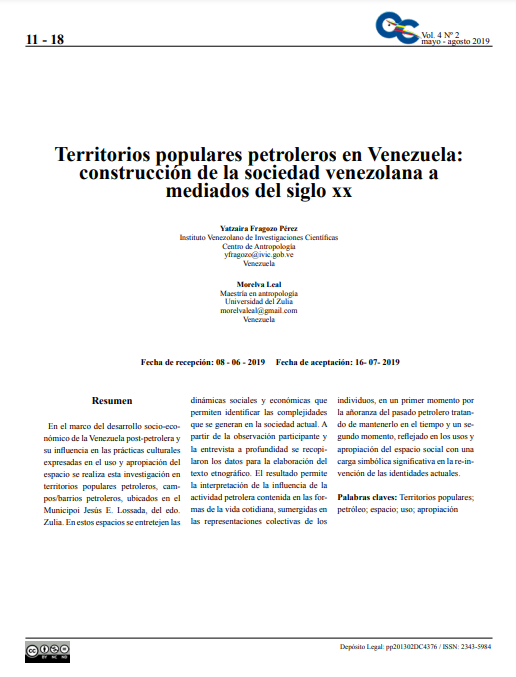Popular territories petroleros in Venezuela: construction of the venezuelan society through the 20th century
Popular territories; oil; space; usage; appropriation
Keywords:
Territorios populares; petróleo; espacio; uso; apropiaciónAbstract
This research is carried out within the framework of the socio-economic development of the post-petroleum Venezuela and its influence on cultural practices expressed in the use and appropriation of space in territories popular oil, oil fields/neighborhood, located in the Jesús E. Lossada municipality, edo. Zulia. In these spaces, the social and economic dynamics are intrinsically connected, displaying the complexities that arise in today's society. Based on participant observation and depth interview, data were collected for the elaboration of the ethnographic text. The results allow the interpretation of the oil’s industry influence contained in forms of everyday life and the collective representations of individuals. In consequence, people living in oil fields are melancholic by/for the past, trying to keep it alive. Finally, behind the usage and appropriation of the social space exists a significant symbolic burden in the re-invention of the identities.
Downloads
References
Amodio, E.; Ontiveros, T.(1995) .Historias de identidad urbana. Tropykos: Caracas
Bachelard, G. (1957). La poética del espacio. Fondo de Cultura Económica: Venezuela
Bolívar, T. BALDO, J. (1995). La cuestión de los barrios. Monte Ávila Editores: Caracas
Cristini, M. Moya, R (2008). Ciudades y calidad de vida en América Latina y el Caribe: evolución histórica y comparación internacional. Banco Interamericano de Desarrollo
Diaz Añez, V. (2008). La Concepción: crónicas de un campo petrolero. PDVSA Petrowayuu: Caracas
Diaz DE Rada, Á.(1997). La lógica de la investigación etnográfica. Editorial TROTTA: Madrid
Echeverria, J.(1994). Telépolis. Ediciones Destino: Barcelona
Feliz, A. y Montalvo, J.(2003). Recuperación de la historia local. Federación Internacional Fe y Alegría: Caracas
Geertz, C. (1973). Interpretación de las culturas. New York, Basic Books.
Guber, R. (2001). La etnografía. Grupo Editorial Norma: Bogotá
Hall, E. (1973). La dimensión oculta. Enfoque antropológico del uso del espacio. Instituto de Astudios de Administración Local- Madrid
Ammersley, M. Y Atkinson, P. (1994). Etnografía. Métodos de investigación. Editorial Paídos: Barcelona.
Lefebvre, H.(1970). De lo rural a lo urbano. Ediciones Península: Barcelona
________________ (1974). La producción del espacio. Ediciones Península:Barcelona
Levi, G. (1993). Sobre la microhistoria. Alianza: Madrid
Ontiveros, T. (1999). Memoria espacial y habitad popular urbano.Tropykos: Caracas
Ortega Varcalcel, J. (2000). Los horizontes de la geografía. Teoría de la geografía. Editorial Ariel: Barcelona
Otero Silva, M. (1996). Casa Muertas. Monte Ávila Editores: Caracas
Quintero, R. (1985). La cultura del petróleo. División de publicaciones de la Universidad Central de Venezuela: Caracas
Turner, V. (1999). La selva de los símbolos. Editorial Siglo XXI: Madrid
Silva, A. (1992). Imaginarios Urbanos. Edit. Tercer Mundo: Bogotá
Valenzuela, J. (2000). Decadencia y auge de las identidades. Plaza yValdés: México

Downloads
Published
How to Cite
Issue
Section
License

This work is licensed under a Creative Commons Attribution-NoDerivatives 4.0 International License.







